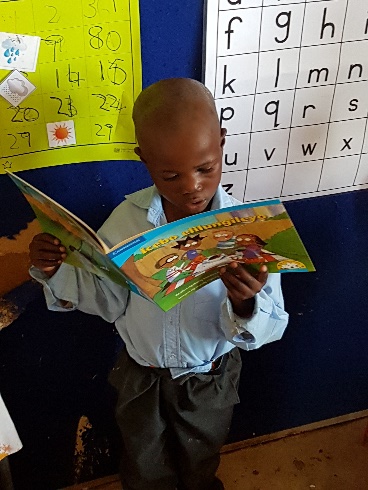Mother tongue magic at work
Mother tongue magic at work vuyelwanIt is often said that children learn better in their mother tongue and this is proving to be true in the country.
UNICEF South Africa and the Nelson Mandela Institute for Rural Development (NMIRD) are working magic in a rural part of South Africa.
They launched the Bilingual Interactive Differentiated Classrooms programme in the Eastern Cape in 2007. Also known as the ‘magic classroom collective’, the underlying premise of this initiative is that teaching should be engaging, diverse and fully grounded in its local context. In the case of the Eastern Cape, this means promoting learning in isiXhosa, the majority language in the province. 
Between 2013 and 2017, UNICEF South Africa contributed about R14 million (USD 1.2 million) to the NMIRD. Evidence shows that there has been an improvement in both numeracy and literacy levels of Grade R learners since the inception of the programme over a decade ago.
Its success has led to the University of Fort Hare setting up a bilingual education programme to train teachers to teach in indigenous languages.
Fifty kilometres from the town of Bizana is Dlangezwa Senior Primary School. Established in 1985, the school has 178 learners from Grade R to Grade 7 and the NMIRD has worked with this school since 2009 with a focus on Grades R to 3 learners.
Principal Zamuxolo Mdatya credited it with helping him and his teaching staff realise that the foundation phase of teaching is critical to a child’s development.
Six-year old Thobela Bhoyoyo is an inspiring example of a learner who has benefitted from the programme. This Grade R learner is a confident reader who, according to his teachers, understands the reading text at a level above that of most Grade six learners.
The Bilingual Interactive Differentiated Classrooms programme made books the focus of his learning and showcased his reading ability. Neatly-dressed in his school uniform, this shy little boy said that he loves seeing the words in his home language of isiXhosa. He added that he wants to be a teacher when he grows up and recounted proudly how his friends like him to read to them.
Meanwhile with South Africa celebrating the Centenary of former President Nelson Mandela the country can recall that Madiba had a soft spot for language.
He was once quoted saying “If you talk to a man in a language he understands, that goes to his head. If you talk to him in his language, which goes to his heart.”
South Africa will come alive with activities in celebration of Nelson Mandela’s centenary tomorrow by spreading some Madiba Magic by helping charities, disadvantaged schools and advocating for peace and reconciliation.
Various other government departments and institutions have planned activities for the day - which is also known as National Day of Service - to go out in their numbers to follow in Tata’s footsteps to make a difference by donating time towards humanitarian efforts and disadvantaged communities to inspire a positive change that promotes the culture of ubuntu.